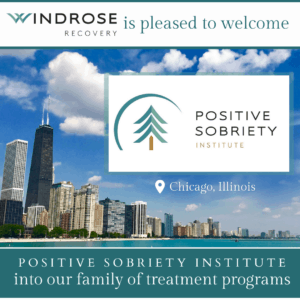
Our Executive Clinical Director, Dr. Chantelle Thomas, recently wrote a feature for TMJ4 in Milwaukee. She discusses how the effects of alcohol can vary from one individual to another, and how its function in someone’s life can change over time.
By Dr. Chantelle Thomas, Executive Clinical Director at Windrose Recovery
When I was accepted into the University of Wisconsin, Health Psychology internship program as the final formalized step in completing my doctorate as a Clinical Psychologist I was incredibly excited. I hailed from Southern California and, outside of my fondness for cheese, I knew relatively little about Midwestern culture. However, I was interested in earnest, “salt of the earth” people that persevered and were good on their word despite or maybe even because of the inclement weather. I did find this to be quite consistently and refreshingly true. The more unexpected reveal of this geographical region was observing the seamless way drinking is woven into so many aspects of social connection.
At the welcome reception for incoming doctoral students, I went to grab a refreshment and found a whole assortment of craft beers interspersed with the soda. I paused. Somehow, it seemed out of place at a school-sponsored event. I had been to many graduate school functions and yet never considered that a time to imbibe with my…professors? These moments consistently surfaced as I settled into my new life in Madison. My first encounter of a “tail-gating” experience at a Badgers’ home game was similarly eye-opening. It was not just the tidal wave of red that caught my attention as I passed tent after tent but rather the demographics of the crowd. Expecting to see mainly college students instead I encountered a much more chronologically diverse crowd involving multi-generational fans tipsily raising more than one glass before the breakfast bell had sounded. Just last Monday night, I was with my daughter at the local youth marina where a crowd of parents anxiously looked on to see their children fumbling with life vests and rudders. A collection of parents sitting on park benches all happened to bring their mini coolers and were exchanging beers and awkwardly making “small talk”. None of these observations are intended as judgment but rather an observation about how embedded drinking culture appears to be in a wide range of gatherings. Another factor worth noting is how chameleon-like alcohol use can appear depending on the person consuming it and the context surrounding it.
Having worked with substance use disorders for almost twenty years, I find myself consistently curious about one question: How does alcohol function for different people? Alcohol is an indelible aspect of our society. It is embedded in the fabric of our culture. Perhaps, in part, this is due to the versatility of this substance. People often turn to alcohol with the expectation that it can make things better, provide relief, and even quiet unrelenting worries.
Repeatedly I am fascinated to observe the wide range of responses alcohol can occasion: energy booster, stress reducer, happiness inducer, anxiety soother, sleep aid, and/or social lubricant. In other instances, pervasive alcohol use can induce depression/anxiety, enhance numbness, incite anger, trigger high risk behavior, and result in multi-organ failure. The most curious part about alcohol is how its function can change over time for the same person. The magnitude of stressors or the sheer number of unstable elements in an individual’s life can create underlying vulnerabilities that places one’s internal system at high risk for a misuse problem. Simply add alcohol to the smoldering multi-level instability and you can get a full-blown bonfire. College binge-drinking phenomenon clearly reveals that people can go through periods in their life where they drink to excess and then, with some self-reflection, maturation, and environmental changes they figure out how to recalibrate. There are, however, many people that ultimately cannot return to “controlled” drinking. For them, the fantasy that drinking will assuredly occasion a good experience is often eclipsed by resulting regret and shame following an episode of drinking.
Due to a combination of factors both understood and not so well understood, some people simply lose their ability to make good and self-protective choices when they drink. Some people consider this to be a binary issue, you are either an alcoholic or not an alcoholic. You have the genes or the “disease” or you do not. However, my experience treating individuals requiring a residential level of treatment or a “stint in rehab,” has revealed a subset of people who managed to drink alcohol for a time in their lives without resulting destruction to themselves or those around them. These particular people seem to unfortunately and magically crossover some invisible line with their alcohol use. They stop controlling the process of consumption. They take larger and larger risks around their drinking and signs of negatively impacting others only seems to quicken their pace. For individuals with a clear pattern of harming themselves and/or placing others at risk due to their use, the need for treatment feels much clearer and more undeniable.
However, for individuals in the “grey zone,” alcohol can be a very complex issue to unpack. Sometimes the fear about having a problem immediately stops the exploration of how this substance is truly impacting one’s life. I think many people questioning their relationship with alcohol will get stuck at the do I or don’t I have a problem question. Perhaps it’s more useful to explore the nature of one’s relationship with alcohol in all its complexities rather than starting with the impending dread of a label.
In our current times many people are growing weary of the chronic stress of the pandemic circumstances. The whole nation has had an extra dose of things that humans adaptively block out to feel okay: uncertainty, mortality, and a lack of safety and security. In many ways, alcohol has provided temporary numbing of those unpleasant feelings and/or an elevation of too infrequent positive feelings. If your support system is vulnerable and the available outlets for relief start to shrink, alcohol can start to fill those spaces and can serve as a reflexive solution. The research over the last year has highlighted many individuals have relied on drinking as a way to cope. It feels critically important to have ongoing conversations that raise awareness and curiosity about this trend. My work in the treatment space for alcohol-related disorders has consistently shown me that self-criticism and judgment immediately halt all meaningful exploration. We have all been facing a prolonged crisis that has resulted in a reflexive and chronic traumatic response for so many individuals. The severity and intensity of this response is framed by so many factors including personal history, availability of resources, and awareness of what has transpired. In this regard, we must take a moment to pause and deeply consider the questions: What am I soothing? What am I feeling? What feels intolerable?

Dr. Chantelle Thomas is Windrose Recovery’s Executive Clinical Director and a Clinical Psychologist specializing in addiction treatment, trauma, and health psychology. With her experience in trauma work, Dr. Thomas guides the clinical team in the comprehensive assessment and treatment of each guest. Dr. Thomas is also a certified biofeedback practitioner, providing clients with an added dimension of insight and discovery helping them better regulate and understand the psychological impact of stress and chronic trauma. Dr. Thomas began her career as the Program Director for a dual-diagnosis addiction and trauma treatment center in Malibu, California. After receiving her PhD in Clinical Psychology, she completed her internship and post-doctoral fellowship in Health and Rehabilitation Psychology at the University of Wisconsin School of Medicine and Mental Health. While there, she gained specialized expertise in medical-surgical consultation, trauma-informed therapy and chronic pain treatment. Through the University of Wisconsin’s School of Family Medicine, Dr. Thomas then joined Access Community Health Center as a Behavioral Health Consultant to primary care physicians where she innovated the development of a substance use disorder consultation clinic embedded within primary care. Her background in research-supported treatment modalities directly informs her ability to ensure the most effective interventions are incorporated into Windrose Recovery’s holistic programs.
If you’re looking for more information about Windrose Recovery’s family of treatment programs, or are concerned about how the last year has affected someone close to you in their reliance on drugs or alcohol, reach out today to speak with our admissions team.

